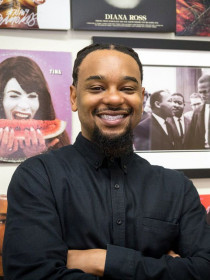
Marcus Anthony Hunter
Professor of Sociology & African American Studies, and Scott Waugh Endowed Chair in the Division of the Social Sciences, University of California-Los Angeles
Chapter Member: Los Angeles Unified SSN
Areas of Expertise:
Connect with Marcus
About Marcus
Hunter is generally interested in urban race relations, sexuality, politics, gender, history and change with an especial focus on urban black Americans. He is the coiner of #BlackLivesMatter, and author of four books: Black Citymakers: How The Philadelphia Negro Changed Urban America, Chocolate Cities: The Black Map of American Life (coauthored with Zandria F. Robinson), The New Black Sociologists, and the forthcoming Radical Reparations™ (Amistad). In addition, Hunter’s research and commentary on urban black life and inequality has been featured in the journals the Du Bois Review, City & Community, Sexuality Research & Social Policy and the Washington Post, Talking Points Memo, and the New York Times.
Contributions
How the New Voter ID Laws Impede Disadvantaged Citizens
Basic Facts Brief,
No Jargon Podcast
In the News
Opinion: "GOP Tax Cuts Would Hammer California's Poor," Marcus Anthony Hunter, The Sacramento Bee, November 7, 2017.
Opinion: "Black Women and Girls in California Have Had to Make a Lot of Lemonade," Marcus Anthony Hunter (with ), Los Angeles Sentinel, June 1, 2016.
Opinion: "Education Excellence for African Americans?," Marcus Anthony Hunter (with ), Jet, July 9, 2015.
Opinion: "22 Million Reasons Black America Doesn’t Trust Banks," Marcus Anthony Hunter, The Conversation, February 26, 2015.
Opinion: "Minority Voters Tell Their Stories," Marcus Anthony Hunter (with ), November 6, 2014.
Opinion: "What Michael Sam's Kiss Means for the Most Invisible: Black AND Gay," Marcus Anthony Hunter, Talking Points Memo, May 15, 2014.
Opinion: "Voter Suppression is a Threat to All," Marcus Anthony Hunter, The Washington Post, January 20, 2014.
Opinion: "Republican Attitudes toward Urban America," Marcus Anthony Hunter, New York Times, October 17, 2012.
Publications
"Between Using a Rock & Living in a Hard Place" Current Anthropology 55, no. 1 (2014): 14-15.
Offers a new way to understand the impact of poverty, beyond the conventional narratives that seek to identify culprits and victims, guns and drugs, dilapidated streets, and local politics; discusses the necessary intersection between urban policies that reduce the climate of violence while also recognizing the agency of urban minorities that is already and always present.
"Ecologies, Post-Modern Urbanisms, and Symbolic Economies: A Comparative Assessment of American Urban Sociology" Comparative Sociology 13 (2014): 185-214.
Compares urban sociological methods and theories through sections focusing on the organization of the city, ethnography, and neighborhoods; underscores paths taken in the field whilst highlighting potential new directions.
"Black Philly after The Philadelphia Negro" Contexts 14, no. 1 (2014): 26-31.
Examines the relationship of Philadelphia’s Seventh Ward black residents to the progressive politics that shaped urban New Deal policies and coalitions between 1920 and 1940; discusses the shifting political allegiances of black Americans by examining housing reform and the development of public housing; identifies various stakeholders and key players in reform efforts of Philadelphia’s Seventh Ward.
"Black Citymakers: How the Philadelphia Negro Changed Urban America" (Oxford University Press, 2013).
Follows the transformation of Philadelphia's Seventh Ward neighborhood from predominantly black at the beginning of the 20th century into a largely white upper middle class and commercial neighborhood by the century’s conclusion.
"The Same Sex Marriage Racial Divide" Contexts 12, no. 3 (2013): 74-76.
Examines some of the tangled past behind African Americans’ reluctance to accept gay marriage.
"A Bridge over Troubled Urban Waters: W.E.B. DuBois’s The Philadelphia Negro and the Ecological Conundrum" DuBois Review 10, no. 1 (2013): 7-31.
Generates new understandings of the contributions of W. E. B. Du Bois's The Philadelphia Negro (1899) for sociology and social science; explores the interwoven nature of cultural and economic factors in the sustenance of Philadelphia's Black Seventh Ward and suggests that the agency of African Americans is a critical, yet undervalued, aspect of their urban living.
"All the Gays are White and All the Blacks are Straight: Black Gay Men, Identity and Community" Sexuality Research & Social Policy 7, no. 2 (2010): 81-92.
Examines the identity politics of black gay men to understand how they make sense of the larger black and gay communities. Using data from fifty qualitative interviews, finds that these men operate with varied notions of community which impact their investments in the larger minority communities to which they belong.
"The Nightly Round: Space, Social Capital and Urban Black Nightlife" City & Community 9, no. 2 (2010): 165-186.
Examines how urban blacks use extra-neighborhood spaces like nightclubs to mitigate social and spatial isolation. Drawing on a year of fieldwork, finds that spaces like nightclubs provide an opportunity for individuals to build their social capital, developing and maintaining ties that provide critical social support and social leverage.